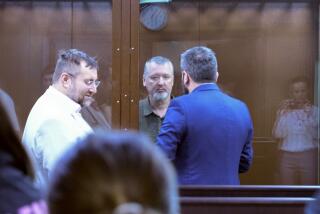Kremlin infighting gets an airing
- Share via
MOSCOW — A former KGB officer with long-standing ties to President Vladimir V. Putin declared Tuesday that infighting among the current and former secret police who dominate the government threatens to bring political instability to Russia.
Viktor Cherkesov, head of the Federal Narcotics Control Service, said that the former KGB agents appointed to powerful posts by fellow ex-spy Putin had saved Russia from collapse after the chaos of the 1990s. But now, he said, the network itself is being torn by bitter rivalries.
Putin, who is required by the constitution to step down next spring, is widely expected to endorse a favored successor in the next few months. But it may be difficult for any choice to satisfy all the factions around him that are vying for power and the economic spoils that often come with it.
Cherkesov, in offering a rare public glimpse of that struggle, hinted that it could explode into open political warfare among groups trying to influence the succession.
“A ‘war of all on all’ will result in a complete disintegration of the network,” Cherkesov wrote in the Kommersant newspaper. “We must prevent a scandal and all-out fighting.”
Although analysts speak frequently of Kremlin infighting, it is rare for the figures involved to acknowledge the existence of such conflict.
Putin joined the KGB in the 1970s, served as an agent in East Germany, and resigned from the agency in 1991. He was appointed head of the Federal Security Service, the KGB’s domestic successor, in 1998 and served in that post for about a year.
As president, he has appointed many other former KGB officers to key positions, including First Deputy Prime Minister Sergei B. Ivanov, considered a leading candidate to become the country’s next president.
Such officials, known as siloviki, or “powerful ones,” are seldom willing even to acknowledge that as a group they play a decisive role in running the country.
But Cherkesov bragged that former KGB officers had collectively formed a “hook” that was grabbed onto by post-Soviet society to save itself as it was “tumbling into an abyss.”
Now, he said, that clique’s unity is dissolving.
Analysts suggested that the article revealed a buildup of severe tensions inside the Kremlin in the run-up to the presidential election.
“I don’t know what happened at the very top of the country to provoke this volcanic eruption, but it must have been something like a nuclear explosion deep in the basements of the Kremlin,” said Olga Kryshtanovskaya, director of the Institute for Applied Politics, a Moscow think tank.
“Passions must really be boiling up inside Putin’s great team to compel Cherkesov to speak up publicly like that,” she said. “Cherkesov really did a disservice to Putin because he proved by his article that there is a serious war being waged between various Kremlin clans and groups.”
Cherkesov’s statement appeared to be triggered by the arrests last week of some of his subordinates for suspected abuses of power. Those individuals, according to Russian media reports, had investigated a high-profile furniture smuggling case that led to the arrests last spring of five senior officers of the Federal Security Service, or FSB.
Cherkesov emphasized that he was not just defending his subordinates. But he sent three of his deputies to a Moscow court Tuesday to seek freedom for Lt. Gen. Alexander Bulbov, one of the detained officers, who was accused of divulging state secrets.
“We are ready to provide guarantees that Bulbov will not flee and will report for questioning, and that he will abide by all restrictions envisioned in the law,” agency Deputy Director Alexander Fyodorov said in comments reported by the Russian news agency Interfax.
The article was not addressed to anyone but had the flavor of an open letter, perhaps to Putin above all. Cherkesov was a first deputy director of the FSB in the late 1990s, including a period when Putin headed the agency.
“Whoever can help the Federal Narcotics Control Service rid itself of turncoats may always count on me,” Cherkesov wrote. He then added, in an apparent allusion to the arrests: “But whoever is prepared to try to turn the noble cause of doing away with corruption into something else may count on resistance from me.”
Stanislav Belkovsky, president of the National Strategy Institute, a Moscow think tank, said the entire affair was “not about a bunch of corrupt officers,” but rather reflected a struggle between supporters and opponents of Putin’s deputy chief of staff, Igor Sechin, who is considered by many observers to be the main leader of the siloviki.
“The fact is that Cherkesov has always been Sechin’s opponent,” Belkovsky said. “Cherkesov’s man, Gen. Bulbov, who is in custody now, was bugging offices of the FSB and Interior Ministry leadership.
“The clans involved finally find it impossible to resort just to intrigues to sort out their relations,” Belkovsky said, “and it resulted in Cherkesov breaking all the rules and resorting to public politics, which is an unprecedented step.
“It means that the scuffle gets out from under the carpet and into the open now.”
Times staff writer Sergei L. Loiko contributed to this report.
More to Read
Sign up for Essential California
The most important California stories and recommendations in your inbox every morning.
You may occasionally receive promotional content from the Los Angeles Times.










